Capacitors are essential components in electronic circuits, storing and releasing electrical energy as needed. However, under certain circumstances, capacitors can experience catastrophic failures that result in explosions.
Understanding the reasons behind these explosions is crucial for engineers, technicians, and electronics enthusiasts.
This article explores the various factors that can cause capacitors to explode, including overvoltage, reverse polarity, internal faults, poor quality manufacturing, excessive heat, and more.
By examining these causes, we can gain insight into the importance of proper capacitor selection, handling, and usage to prevent hazardous situations and ensure the reliable operation of electronic systems.
What Does A Capacitor Do?
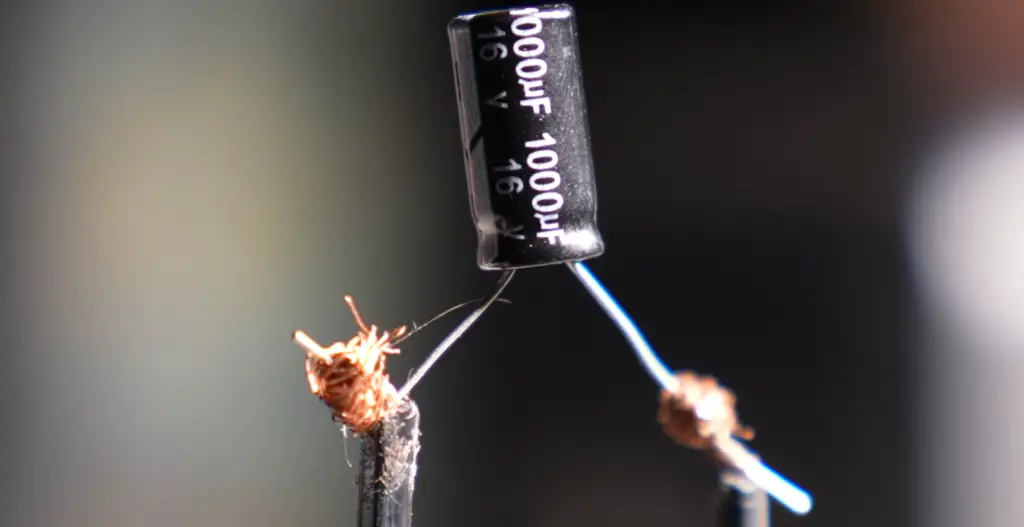
At its core, a capacitor consists of two conductive plates separated by a dielectric material. The conductive plates can be made of various materials, such as aluminum or tantalum, while the dielectric material is usually an insulating substance like ceramic, polyester, or electrolytic fluid. The capacitance value of a capacitor determines its ability to store charge, and it is measured in farads (F) or its subunits such as microfarads (µF) or picofarads (pF).
One of the primary functions of a capacitor is to smooth out electrical signals by acting as a filter. When connected in parallel with a power supply, it absorbs and releases energy, stabilizing voltage levels and preventing sudden fluctuations. This property is particularly useful in power supply circuits, where a steady and reliable voltage is crucial for the proper functioning of electronic devices.
Capacitors are also widely used in timing circuits and oscillators. By determining the rate of charge and discharge, they can control the frequency and duration of electrical pulses. This feature is essential in applications such as electronic clocks, timers, and tone generators.
Furthermore, capacitors play a vital role in energy storage systems. They are often utilized in conjunction with batteries to provide rapid bursts of power when needed. For example, in camera flashes or electric vehicles, capacitors can quickly discharge stored energy to meet high power demands, complementing the slower energy release from batteries.
Capacitors are commonly used in audio systems to enhance sound quality. They act as coupling or decoupling devices, allowing the passage of alternating current (AC) signals while blocking direct current (DC). This prevents unwanted DC voltage from interfering with audio signals and helps eliminate undesirable hum or noise in audio circuits.
Another notable application of capacitors is in motor-starting circuits. When an electric motor is switched on, it requires an initial surge of power to start rotating. Capacitors are employed to provide this extra boost by temporarily storing energy and delivering it to the motor.
The Risks Of Failing Or Exploding Capacitors
Capacitors are an important component in many electronic devices, and their failure or explosion can pose significant risks. Here are some of the risks associated with failing or exploding capacitors:
- Fire and Explosion: When a capacitor fails, it can release a large amount of energy in the form of heat and sparks, potentially resulting in a fire or explosion. This is especially a concern for large capacitors used in high voltage systems;
- Damage to Equipment: A failing or exploded capacitor can cause damage to the equipment it is connected to, leading to downtime and repair costs;
- Personal Injury: If someone is in close proximity to a failing or exploding capacitor, they can be at risk of injury from flying debris or electric shock;
- Environmental Hazard: Capacitors can contain hazardous materials, such as PCBs, that can be released if the capacitor fails or explodes. This can pose a risk to the environment and require special handling for disposal [2];
It is important to follow proper safety procedures and maintenance protocols to minimize the risks associated with failing or exploding capacitors. Regular inspections, preventive maintenance, and adherence to safety guidelines can help reduce the chances of capacitor failure and promote safe operation of electronic systems.
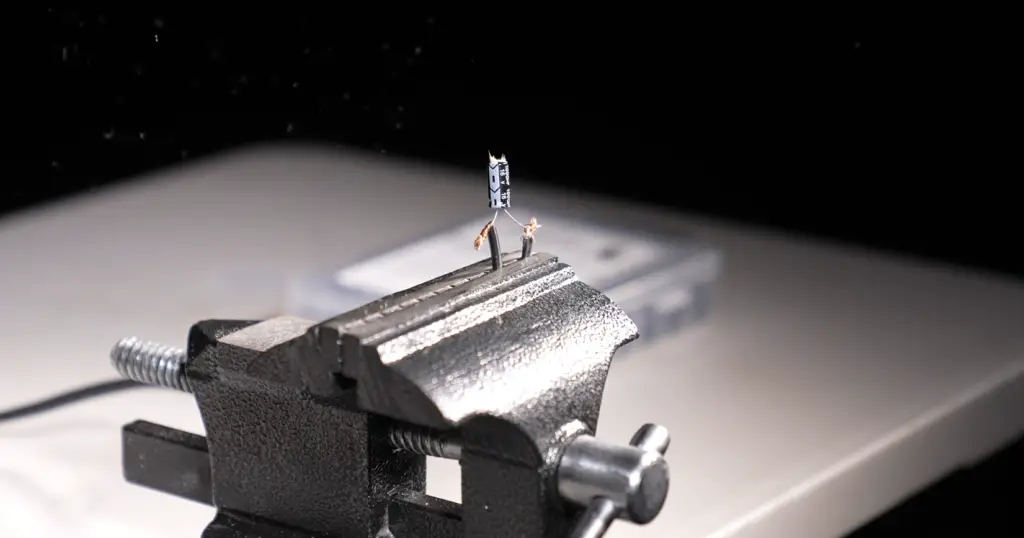
Why Do So Many Capacitors Fail:
1. Becoming Overheated by the Sun
Excessive heat can be detrimental to capacitors, especially when they are exposed to direct sunlight for extended periods. Heat causes the dielectric material inside the capacitor to degrade, leading to a decrease in capacitance and overall performance.
Additionally, the expansion and contraction of materials due to temperature variations can cause mechanical stress, leading to the development of cracks or leaks in the capacitor’s structure. To prevent overheating, capacitors should be installed in well-ventilated areas or shielded from direct sunlight.
2. Becoming Overheated by the Unit Running Too Long and Hard
Capacitors can also overheat due to the excessive strain placed on them by the equipment they are installed in. This is particularly common in devices that operate for long periods or under heavy load conditions. Continuous usage and high currents generate heat, which can cause the capacitor’s internal temperature to rise beyond its safe operating limits. Overheating can lead to a decrease in capacitance, increased internal resistance, and ultimately, the failure of the capacitor. Adequate cooling mechanisms, such as fans or heat sinks, should be employed to dissipate heat and prevent capacitor overheating.
3. Power Surges
Power surges, which are sudden and temporary increases in voltage, pose a significant risk to capacitors. When exposed to a power surge, capacitors may experience voltage spikes that exceed their rated voltage.
This can result in the breakdown of the dielectric material or the insulation between the capacitor plates, leading to a short circuit or catastrophic failure. To protect capacitors from power surges, surge protectors or voltage regulators should be used in the circuit.
4. Lightning Strikes
The immense energy of a lightning strike can cause capacitors to fail instantaneously, rendering them useless and potentially damaging other components in the process. To mitigate the risk of lightning damage, surge protection devices should be installed at the point of entry for electrical systems.
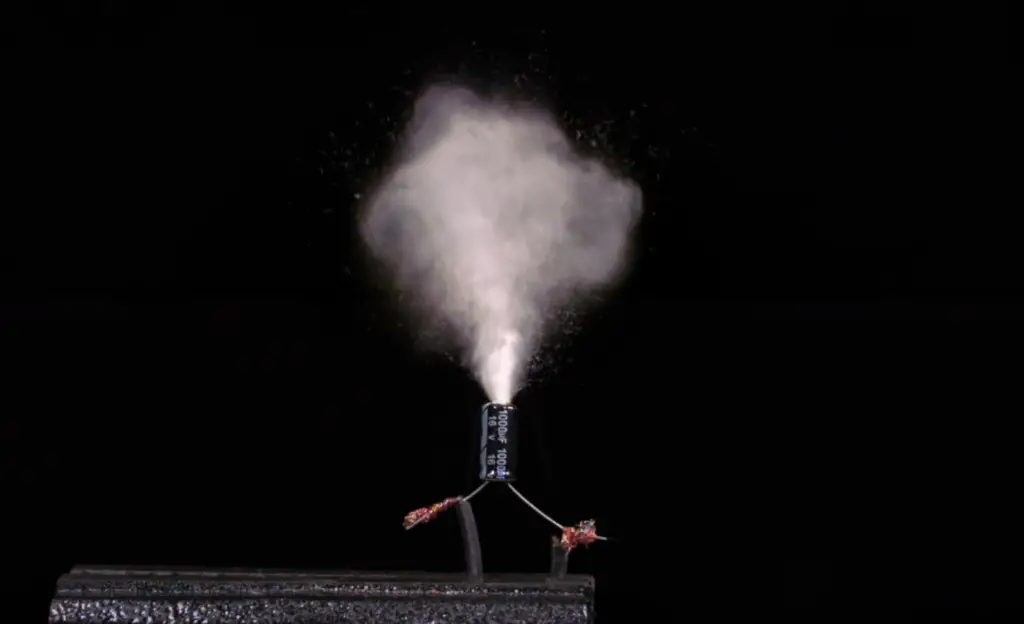
5. They Wear Out Due to Age and Use
Like all electronic components, capacitors have a limited lifespan. Over time, the continuous exposure to electrical stress, temperature variations, and other environmental factors can cause the deterioration of the capacitor’s materials. The dielectric material may degrade, leading to an increase in leakage current or a decrease in capacitance.
Additionally, repeated thermal cycles can cause solder joints to weaken or crack, affecting the capacitor’s electrical connections. Regular maintenance and periodic replacement of capacitors are necessary to ensure the optimal performance and longevity of electronic devices and systems.
How Do You Know If Your Capacitor Is Failing:
The Compressor Struggles to Start and Then Shuts Off Quickly
One of the telltale signs of a failing capacitor in an air conditioning system is when the compressor struggles to start. When the capacitor is no longer able to store and release energy effectively, it cannot provide the necessary power boost for the compressor to start smoothly.
As a result, the compressor may make a humming noise, struggle to start up, and eventually shut off quickly. This cycling behavior indicates a potential issue with the capacitor [3].
The Unit Starts and Stops Over and Over
A failing capacitor can cause the air conditioning unit to start and stop in rapid succession. The capacitor’s decreasing ability to store and discharge electrical energy can lead to intermittent power supply to the system.
The unit may start running briefly, then abruptly shut off, only to restart again. This frequent cycling is an indication that the capacitor’s performance is compromised and needs attention.
The AC Is Not Blowing Cold Air
When a capacitor is failing, it can affect the overall cooling performance of the air conditioning system. Capacitors are involved in the regulation of voltage and current, which are necessary for the efficient operation of the compressor and fans.
If the capacitor is faulty, it may not be able to provide the correct electrical parameters, resulting in reduced cooling capacity. If your AC is running but not blowing cold air, a failing capacitor could be one of the potential culprits.
A Humming Noise
Capacitor failure can often be accompanied by unusual noises. A common sound associated with failing capacitors is a humming noise. This noise can be heard near the capacitor itself or from the air conditioning unit. The humming noise indicates that the capacitor is struggling to provide the necessary electrical energy, and the motor or compressor is not operating as efficiently as it should.
A Clicking Noise
Another audible sign of a failing capacitor is a clicking noise. When the capacitor’s internal components degrade or become loose, the electrical connection can be disrupted, causing a clicking sound. The clicking noise may be more pronounced during the startup phase of the equipment or when it is under heavy load.
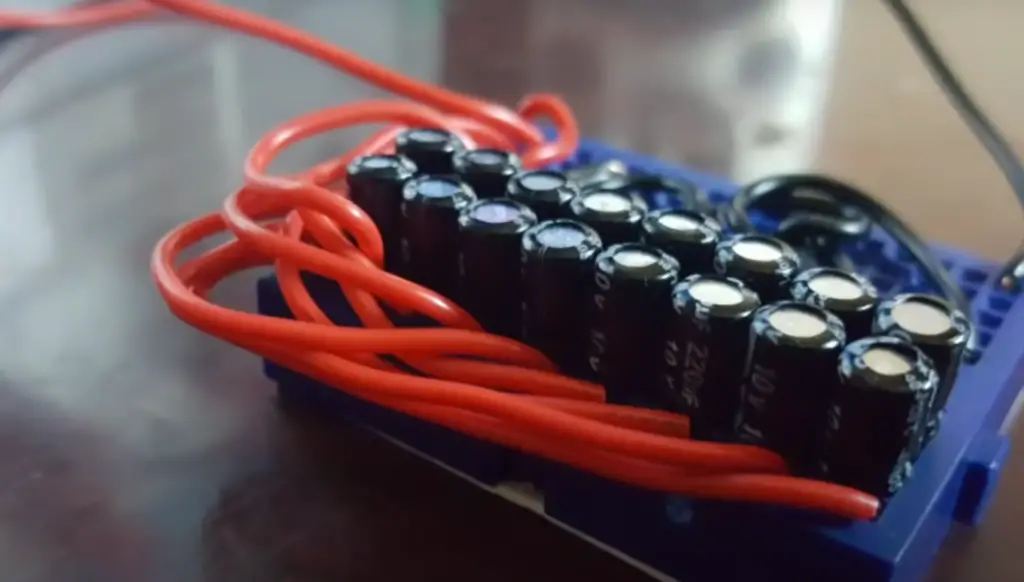
Your System Is Performing Differently Than Previously
If you notice any significant changes in the performance of your air conditioning system or any electrical device, it could be a sign of a failing capacitor. Reduced cooling efficiency, increased energy consumption, frequent cycling, unusual noises, or any other noticeable deviations from the system’s normal operation may indicate that the capacitor is nearing the end of its lifespan.
What Type Of Capacitor Is More Likely To Explode?
Capacitors are generally designed and manufactured to be safe and reliable components. However, under certain conditions, some types of capacitors are more prone to failure, including explosion, than others. The likelihood of a capacitor exploding depends on its construction, specifications, and the circumstances in which it is used.
One type of capacitor that is more likely to explode is the electrolytic capacitor, specifically aluminum electrolytic capacitors. These capacitors are commonly used in electronic circuits, especially in power supply applications, due to their relatively high capacitance values and low cost.
Electrolytic capacitors contain a liquid electrolyte that acts as the dielectric, allowing for higher capacitance. The electrolyte is typically a corrosive substance, and if the capacitor experiences excessive voltage, heat, or aging, the electrolyte can break down and release gas. This gas build-up can cause pressure to build within the capacitor, leading to swelling, bulging, or even explosion in severe cases.
Another factor that can contribute to the potential for explosion is the polarity of electrolytic capacitors. These capacitors have a positive and negative terminal, and if they are connected with reverse polarity or subjected to voltage spikes beyond their rated voltage, it can result in catastrophic failure, including explosion [4].
It’s worth noting that not all electrolytic capacitors are equally prone to explosion. High-quality capacitors from reputable manufacturers, designed for specific applications and operating within their specified parameters, are generally more reliable and less likely to fail catastrophically.
Other types of capacitors, such as ceramic capacitors and film capacitors, are generally considered more stable and less likely to explode compared to electrolytic capacitors. Ceramic capacitors are widely used for their small size and stability, while film capacitors offer good performance in terms of temperature stability, high voltage ratings, and low loss.
In any case, to minimize the risk of capacitor explosion, it is essential to adhere to the manufacturer’s specifications, avoid exceeding the voltage ratings, use proper polarity, and ensure appropriate cooling and ventilation in the circuit design.
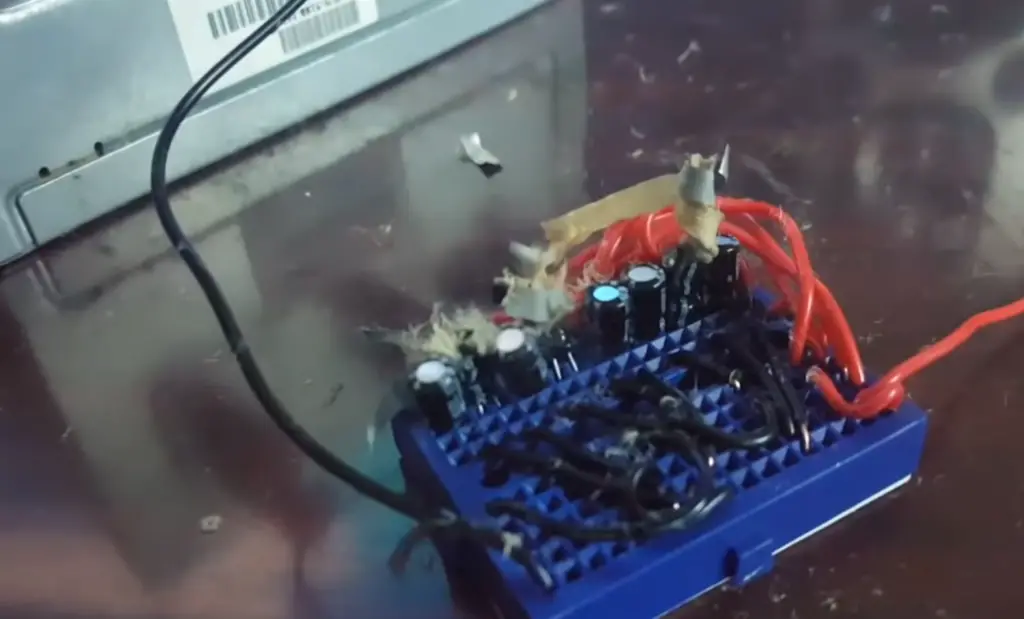
Factors That Would Cause A Capacitor To Explode:
Reverse Polarity
One of the primary factors that can cause a capacitor to explode is the application of reverse polarity. Capacitors have a positive and negative terminal, and if they are connected in reverse, it can lead to a rapid discharge of energy and a surge of current through the capacitor. This can result in the breakdown of the dielectric material and the generation of excessive heat, leading to swelling, bulging, or even explosion.
Overvoltage
Exposing a capacitor to voltage levels that exceed its rated voltage is another significant factor that can cause an explosion. Capacitors have specific voltage ratings that should not be exceeded to ensure their safe operation. When subjected to overvoltage conditions, the dielectric material can break down, leading to a short circuit and the rapid release of energy. This can result in the capacitor heating up and potentially exploding.
Wrong Storage
Improper storage conditions can also contribute to capacitor explosions. Capacitors are sensitive to environmental factors such as temperature, humidity, and exposure to corrosive substances. Storing capacitors in excessively hot or humid environments can cause the deterioration of the internal components and the breakdown of the dielectric material. This degradation can weaken the capacitor’s structural integrity, making it more prone to failure and potential explosion.
Poor Quality
The quality of a capacitor plays a crucial role in its reliability and safety. Low-quality capacitors that are manufactured using substandard materials or inadequate production processes are more prone to failure, including explosions. Poor-quality capacitors may have weak dielectric materials, insufficient insulation, or weak solder joints, increasing the risk of internal short circuits and thermal runaway that can ultimately lead to an explosion.
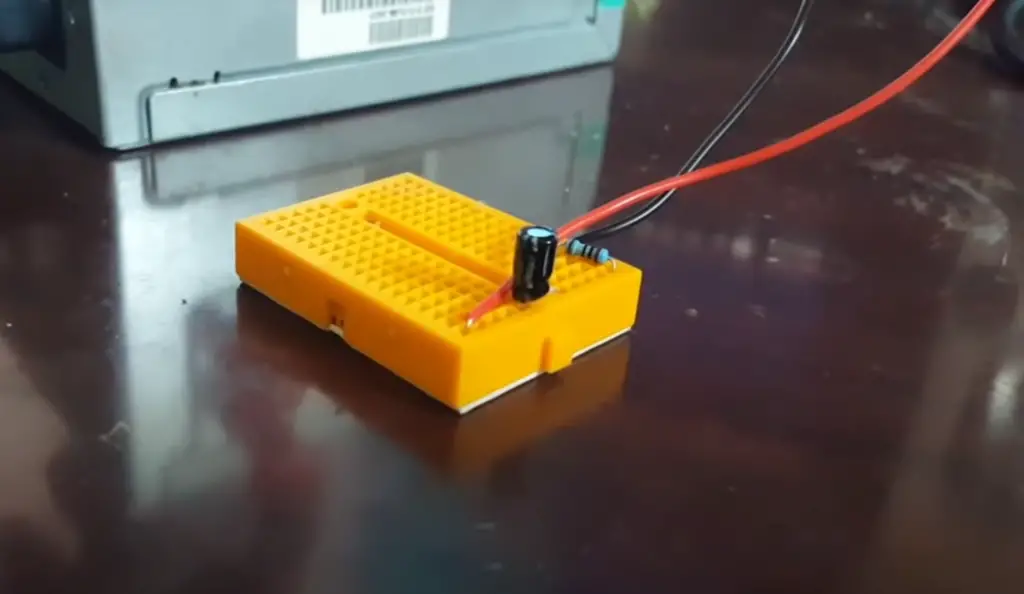
Internal Free and Bulging
If a capacitor is exposed to excessive heat or prolonged operation beyond its capabilities, it may experience internal failures such as the formation of gas or bulging. Internal gas generation can occur due to chemical reactions or decomposition of the electrolyte inside the capacitor. The build-up of gas can lead to increased pressure within the capacitor, causing it to bulge or even explode.
Poor Sealing and Oil Leakage
Certain types of capacitors, such as oil-filled capacitors, rely on proper sealing to contain the internal components and prevent leaks. If the sealing is compromised due to poor manufacturing or external factors, such as physical damage, the internal oil can leak out, exposing the capacitor to air or moisture. This can lead to internal short circuits or the breakdown of dielectric materials, increasing the risk of explosion.
High Temperature
High temperatures can accelerate the aging process of the dielectric material, causing it to degrade and lose its insulating properties. This degradation can result in internal short circuits, thermal runaway, and ultimately, an explosion.
Damage to Enclosure Insulation
The insulation materials used in the enclosure of a capacitor play a crucial role in maintaining its safety. If the enclosure insulation is damaged due to physical stress, excessive vibration, or exposure to corrosive substances, it can compromise the capacitor’s integrity. This can lead to internal short circuits, arcing, and potentially an explosion.
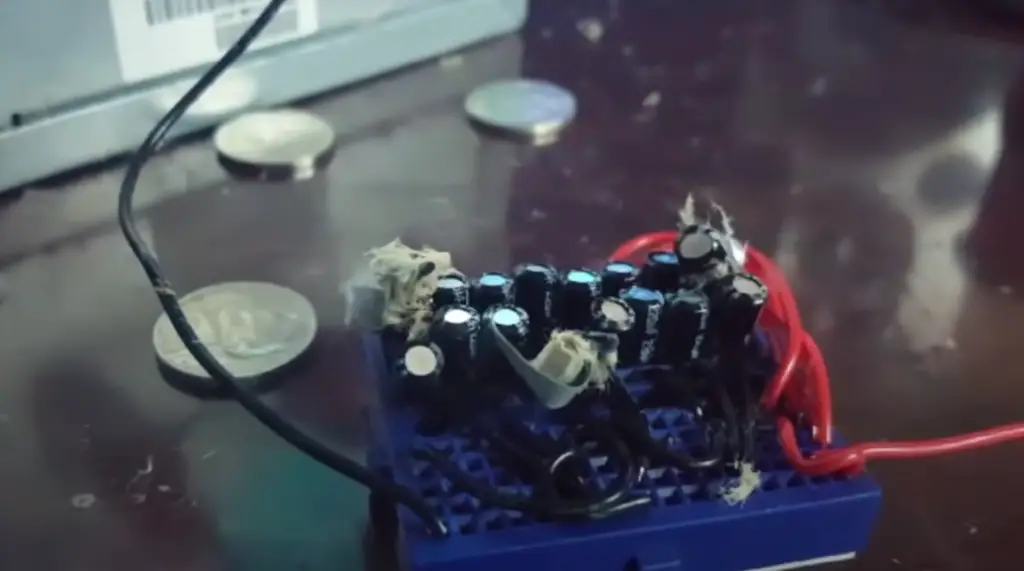
Can A Capacitor That Has Exploded Still Work?
When a capacitor explodes, it is usually a result of a catastrophic failure caused by factors such as overvoltage, reverse polarity, or internal faults. An explosion typically involves the rupture of the capacitor’s casing and the release of its internal components. In such cases, the capacitor is highly unlikely to continue functioning properly. However, it is essential to assess the extent of the damage to determine if any remnants of functionality remain.
Once a capacitor explodes, it indicates a severe failure that compromises its structural integrity and internal components. The explosion usually leads to physical damage, such as cracks or shattered casing, rendering the capacitor unusable in its current state. The internal dielectric material, electrodes, and other essential elements are likely to be compromised or scattered [5].
Even if some components remain intact after an explosion, the capacitor’s electrical performance is likely to be severely affected. Capacitors rely on precise specifications and construction to function optimally, and any damage to these critical elements can result in significant deviations from the intended capacitance, voltage rating, or other parameters. Furthermore, explosions often generate heat, which can cause further damage to the internal components, exacerbating the capacitor’s inability to function correctly.
It is crucial to prioritize safety when dealing with a capacitor that has exploded. An exploded capacitor may release harmful substances or gasses, posing potential risks to human health and safety. Therefore, it is recommended to handle the remnants of the capacitor with caution and dispose of them properly.
In some rare cases, a capacitor that has suffered a minor explosion or partial failure may still exhibit limited functionality. However, it is crucial to consider the risks associated with using a compromised component. The integrity of the capacitor’s insulation, connections, and internal structure may be compromised, leading to potential short circuits, erratic behavior, or further damage to the surrounding equipment.
It is always recommended to replace a capacitor that has exploded or suffered any form of catastrophic failure. Capacitors are relatively inexpensive components, and their proper functioning is essential for the reliable operation of electronic systems. Installing a new capacitor ensures optimal performance, safety, and longevity, reducing the risk of further damage to the equipment and minimizing potential safety hazards.
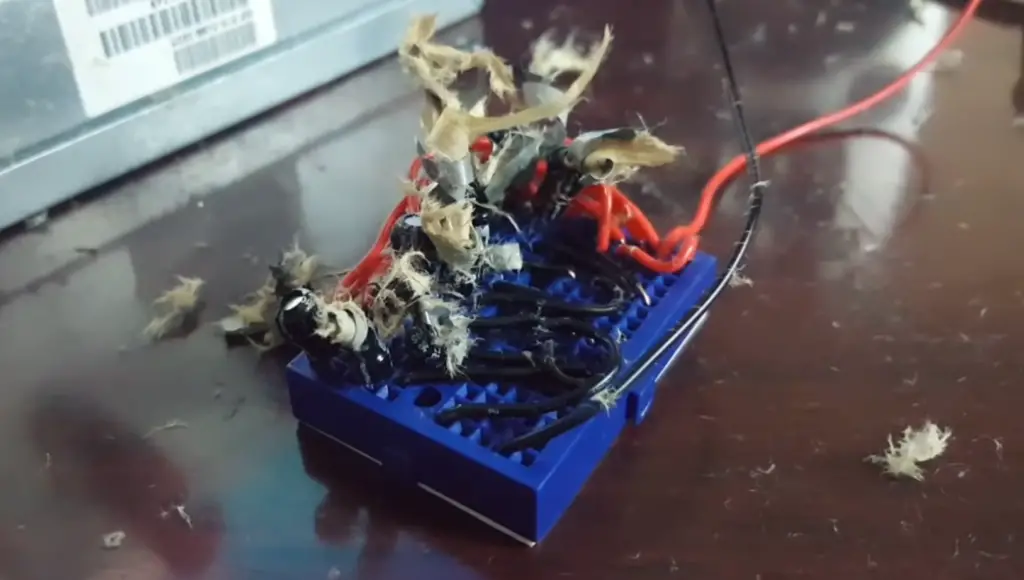
How To Prevent A Capacitor From Exploding?
To prevent capacitors from exploding, here are some steps you can take:
- Choose quality components: Quality capacitors are less likely to fail or explode. It is important to select high-quality capacitors from reputable manufacturers;
- Use the right type of capacitor: Different types of capacitors have different characteristics and capabilities. Using the right type of capacitor for the job can reduce the risk of explosion;
- Adhere to safety guidelines: Follow all safety guidelines and instructions when handling and operating equipment that uses capacitors. This includes avoiding high-voltage situations, properly discharging capacitors before handling them, and using protective equipment as needed;
- Regular maintenance: Regular maintenance and inspections can help detect any issues before they become bigger problems. This includes checking for signs of damage, wear, or other issues that may compromise capacitor performance;
- Proper application: Use capacitors in accordance with the manufacturer’s instructions, and follow accepted safety standards;
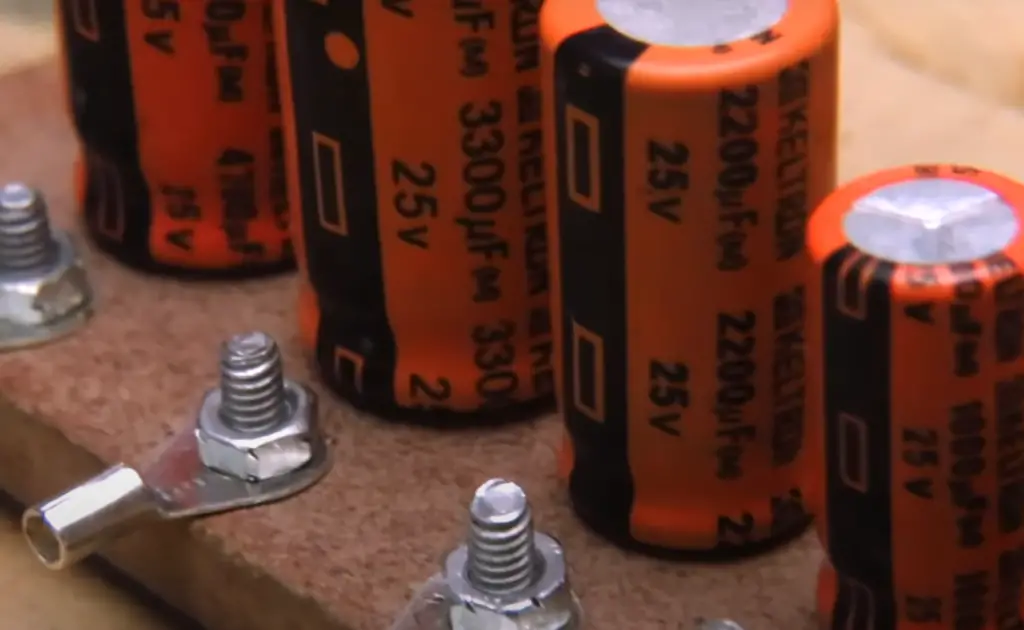
FAQ:
1. What causes the capacitor to burst?
Capacitors can burst due to several reasons, including overvoltage, reverse polarity, internal faults, excessive heat, or manufacturing defects. These factors can lead to the breakdown of the dielectric material, internal short circuits, or the release of gas, resulting in an increase in pressure that causes the capacitor to burst.
2. Can capacitors explode?
Yes, capacitors can explode under certain circumstances. When exposed to extreme conditions such as overvoltage, high temperatures, or internal failures, capacitors can rupture, leading to an explosion. However, it is important to note that capacitor explosions are relatively rare and typically occur in specific situations.
3. What pops a capacitor?
Several factors can cause a capacitor to pop or burst. These include excessive voltage, reverse polarity, internal faults, manufacturing defects, or exposure to extreme temperatures. These conditions can result in the breakdown of the dielectric material or the generation of gas within the capacitor, leading to a sudden increase in pressure that causes it to pop.
4. What is the lifespan of a capacitor?
The lifespan of a capacitor depends on various factors, including its quality, usage conditions, and operating parameters. On average, capacitors can last anywhere from 10 to 20 years, but this can vary significantly [6]. Factors such as voltage stress, temperature, humidity, and electrical load can affect the lifespan of a capacitor.
5. What causes a capacitor to spark?
Capacitors can spark when exposed to high voltages or if they are subjected to reverse polarity. When a capacitor sparks, it indicates a rapid discharge of stored energy, which can result in an electrical arc between the terminals or internal connections.
6. Is it okay to touch a capacitor?
It is generally not recommended to touch a capacitor, especially when it is connected to a power source or if it has recently been in operation. Capacitors can store electrical charge, and touching the terminals or leads can result in an electric shock. It is important to discharge capacitors properly and take necessary precautions when handling them.
7. Why do capacitors get hot?
Capacitors can get hot due to several factors, including high currents, excessive voltage, or high-frequency operation. Heat can be generated as a result of resistive losses within the capacitor or due to internal losses caused by dielectric material imperfections. Additionally, poor quality capacitors or operating beyond their specified limits can contribute to excessive heat generation.
8. Can capacitors cause a fire?
While it is rare, capacitors can potentially cause a fire if they fail catastrophically. Factors such as overvoltage, internal faults, or high temperatures can lead to thermal runaway, resulting in the release of flammable materials or ignition of nearby components. However, it is important to note that properly designed and manufactured capacitors have safety features to minimize the risk of fire.
9. Are blown capacitors toxic?
Blown capacitors can release chemicals or gasses that may be harmful or toxic. Electrolytic capacitors, in particular, may contain corrosive electrolytes that can be harmful if exposed to skin, eyes, or inhaled. It is advisable to handle blown capacitors with care and follow proper disposal procedures to prevent any potential hazards.
10. What does a burst capacitor look like?
A burst capacitor typically exhibits physical signs of damage such as cracks, bulges, or ruptured casing. It may also release its internal components or exhibit burn marks. The visual appearance can vary depending on the severity and nature of the explosion.
11. Can you smell a blown capacitor?
In some cases, a blown capacitor can emit a distinct odor. The smell can be described as pungent or similar to that of burnt electronics. However, not all blown capacitors produce a noticeable smell, particularly if the failure is due to internal faults rather than thermal events.
12. Can you smell a bad capacitor?
A bad capacitor may emit a smell if it has suffered damage or has undergone a catastrophic failure. The odor can be similar to that of burnt electronics or may have a distinct chemical scent. However, it is important to rely on visual inspection and proper testing methods to determine the condition of a capacitor.
13. How hot can capacitors get?
The operating temperature of capacitors varies depending on their type and specifications. While certain capacitors can operate at elevated temperatures (e.g., up to 125 degrees Celsius (257F) for some types), excessive heat can lead to accelerated aging, reduced capacitance, or even catastrophic failure.
14. What is the liquid inside a capacitor?
Electrolytic capacitors, specifically aluminum electrolytic capacitors, contain a liquid electrolyte. The electrolyte acts as the dielectric material and enables higher capacitance values. The electrolyte is typically a corrosive substance, and if the capacitor fails or explodes, the liquid can be released.
15. Can a capacitor shock you?
Capacitors can store electrical charge, and if not properly discharged, they can potentially deliver an electric shock if touched. It is important to handle capacitors with caution, especially if they have been recently connected to a power source.
16. Do capacitors need cooling?
In some cases, capacitors may require cooling to operate within their specified temperature limits. High-temperature environments or applications with high power dissipation can necessitate the use of cooling mechanisms such as heatsinks, fans, or thermal management techniques to ensure optimal capacitor performance and reliability.
17. Is it safe to discharge a capacitor with a screwdriver?
Discharging a capacitor with a screwdriver can be dangerous and is not recommended. Capacitors can store significant amounts of electrical energy, and attempting to discharge them using a screwdriver can result in electrical arcing or potential injury. Proper discharge methods, such as using a resistor or discharging tool, should be followed to ensure safety.
18. Can capacitors drop voltage?
Capacitors, especially those used in power supply applications, can experience voltage drop due to factors such as internal resistance, leakage current, or reactive power consumption. However, this voltage drop is typically within acceptable limits and is accounted for in the design of the circuit.
19. Can lightning damage a capacitor?
Lightning strikes or electrical surges can potentially damage or destroy electronic components, including capacitors. The high voltage and energy associated with lightning can cause voltage spikes or induce high currents that exceed the capacitors’ rated values, leading to failure or damage.
20. Can a capacitor be wired backwards?
It is important to observe the correct polarity when connecting capacitors, particularly polarized capacitors such as electrolytic capacitors. Wiring a capacitor backwards (reverse polarity) can lead to a rapid discharge of energy, overheating, internal breakdown, or even explosion. It is crucial to follow the manufacturer’s guidelines and markings on the capacitor for proper installation.
21. Why do capacitors vibrate?
Vibrations in capacitors can occur due to physical or mechanical stress, such as external vibrations or component resonance. Mechanical vibrations can potentially affect the internal connections, leading to poor contact, increased resistance, or even intermittent failures in extreme cases.
22. Can capacitors last 40 years?
The lifespan of capacitors can vary depending on several factors, including their type, quality, usage conditions, and operating parameters. While some capacitors may last for 40 years or more, it is important to consider the specific application, environmental factors, and recommended maintenance practices to determine their longevity accurately [7].
23. Do capacitors weaken over time?
Capacitors can experience degradation and weakening over time due to various factors, including aging, temperature, voltage stress, and usage conditions. Factors such as electrolyte drying, dielectric breakdown, or increased leakage current can contribute to the gradual decline in a capacitor’s performance or capacitance value.
24. How long do capacitors last if not used?
Capacitors that are not used can still experience aging and degradation over time, although at a slower rate compared to actively used capacitors. The lifespan of unused capacitors can vary depending on factors such as their type, quality, storage conditions (temperature, humidity), and the specific materials used in their construction [8]. Generally, capacitors that are stored properly can last for several years, but it is advisable to periodically test and inspect them before use after prolonged periods of storage.
Useful Video: How CAPACITORS Work
References
- https://modecomfort.com/2020/08/04/what-is-a-capacitor-and-why-do-they-keep-failing
- https://www.samaterials.com/content/why-do-electrolytic-capacitors-explode.html
- https://electronicguidebook.com/what-would-cause-a-capacitor-to-explode/
- https://www.instructables.com/Why-Capacitors-Explodes-/
- https://www.ase.org.uk/sites/default/files/physics%20pdfs/New/Exploding%20Capacitors.pdf
- https://forum.allaboutcircuits.com/threads/what-caused-the-explosion-of-the-capacitors-in-this-scheme.131106/
- https://www.jotrin.com/technology/details/why-does-a-capacitor-explode
- https://www.utmel.com/blog/categories/capacitors/various-reasons-for-the-failure-explosion-and-burning-of-tantalum-capacitors


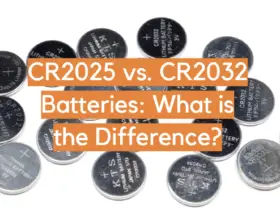


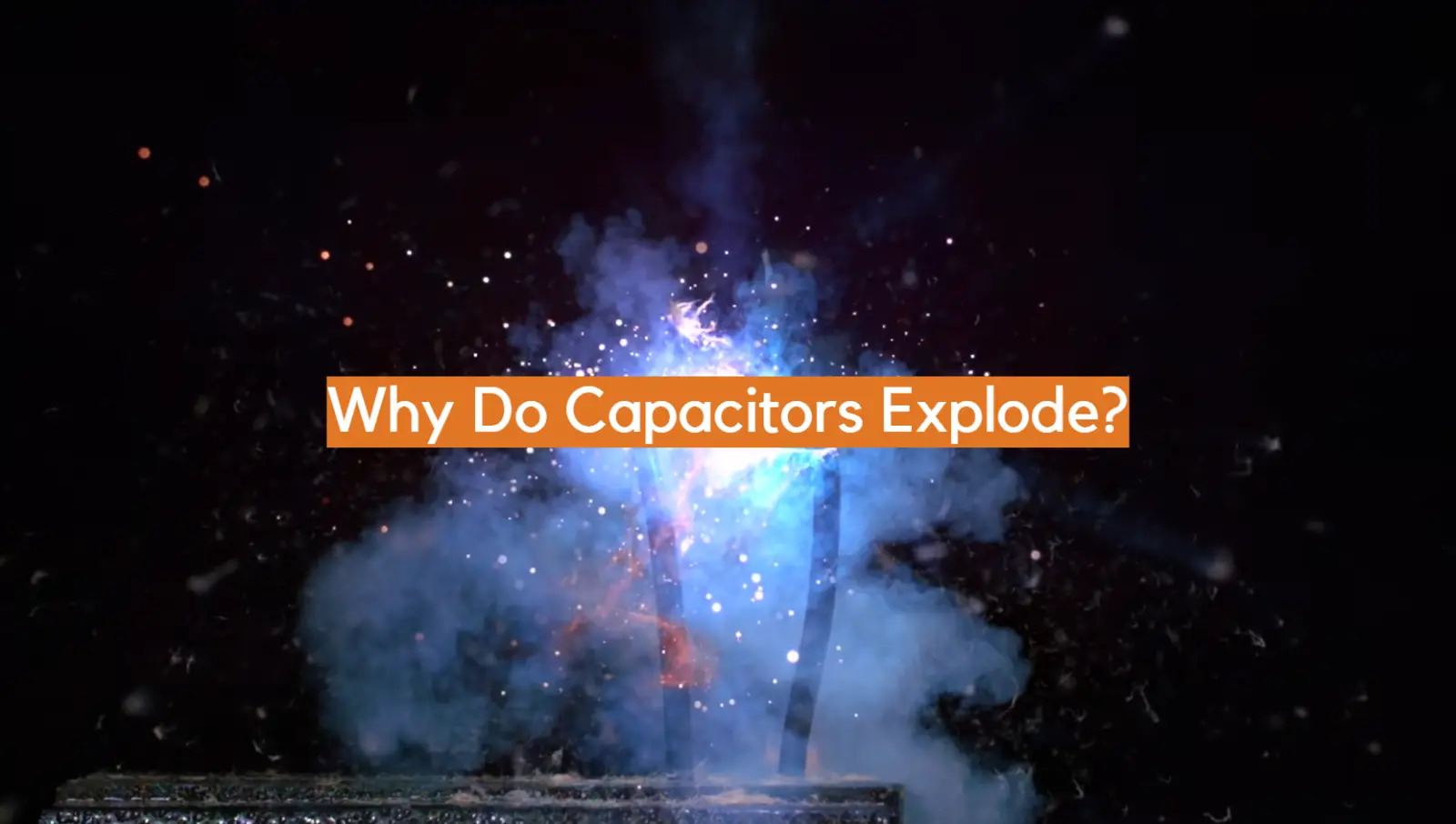








Leave a Reply